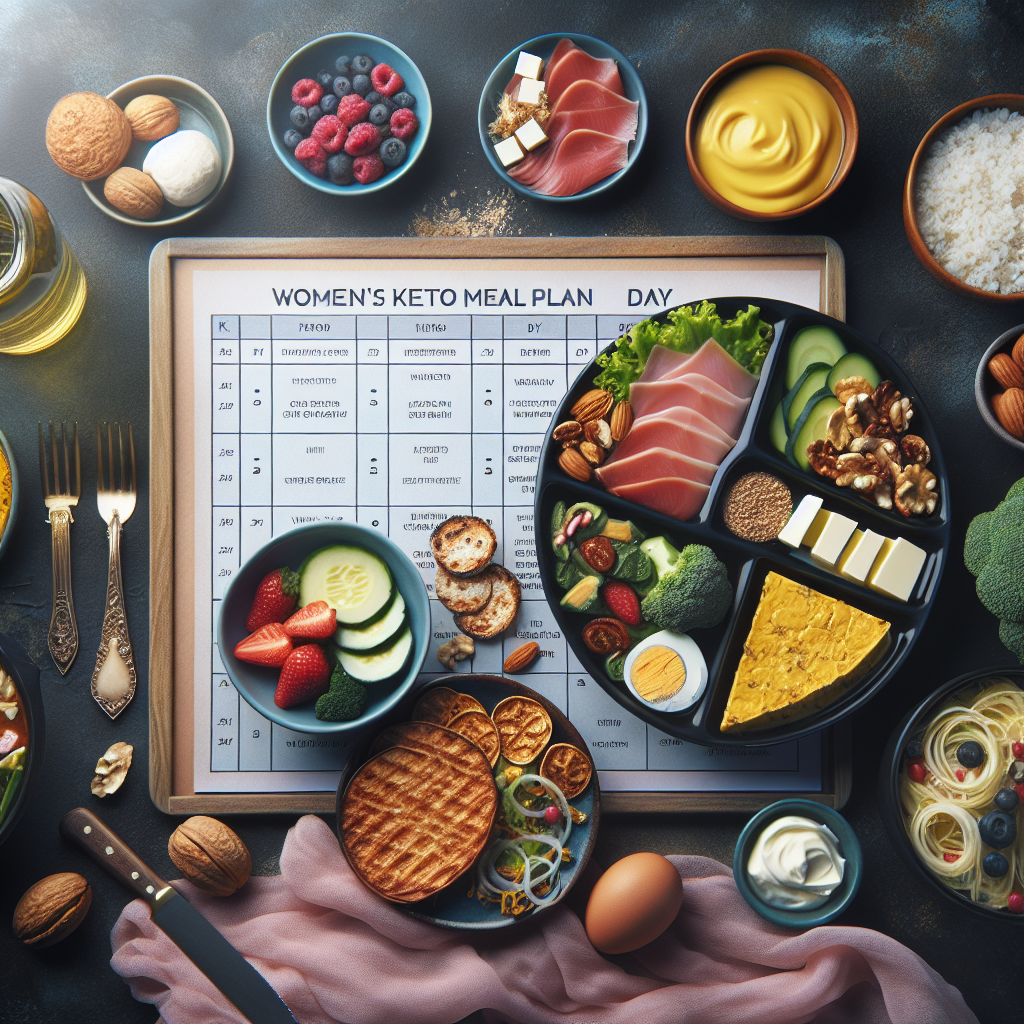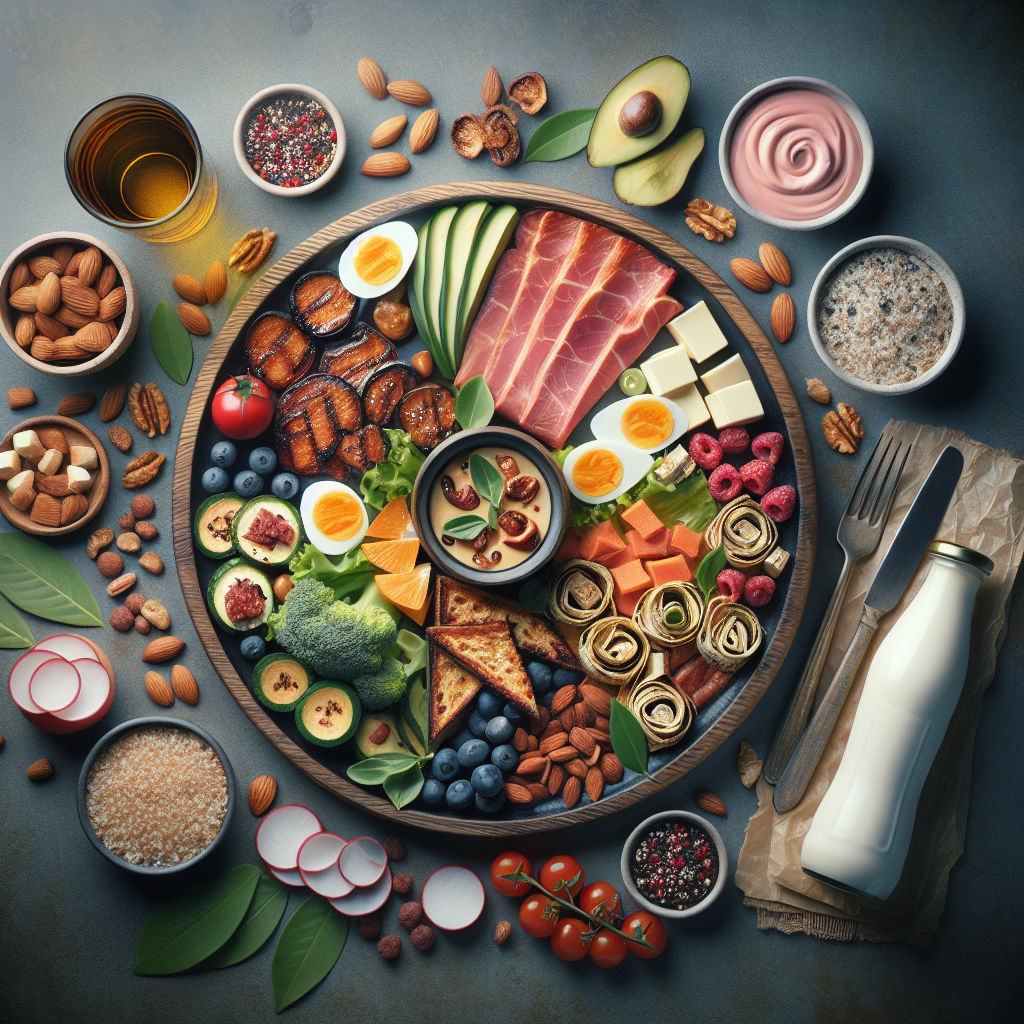
-
Table of Contents
Full Women’s Keto Meal Plan – What You Should Eat in a Day

The ketogenic diet, or keto diet, has gained significant popularity in recent years. This low-carb, high-fat diet is known for its potential benefits in weight loss, blood sugar control, and overall health improvement. However, planning a keto meal can be challenging, especially for women who have specific nutritional needs. This article provides a comprehensive guide to a full women’s keto meal plan, detailing what you should eat in a day.
Understanding the Keto Diet
The ketogenic diet is a low-carb, high-fat diet that aims to shift your body’s metabolism from burning glucose (sugar) to burning ketones (fat) for energy. This metabolic state is known as ketosis. The standard ketogenic diet typically contains 70-75% fat, 20% protein, and only 5-10% carbohydrates.
Research has shown that the keto diet can lead to significant weight loss. A study published in the British Journal of Nutrition found that people on a ketogenic diet lost 2.2 times more weight than those on a calorie-restricted low-fat diet. Furthermore, the diet is known to reduce blood sugar and insulin levels, which can be beneficial for people with diabetes or insulin resistance.
However, it’s essential to note that while the keto diet can offer health benefits, it may not be suitable for everyone. Women, in particular, need to consider their unique nutritional needs when planning a keto diet. For instance, women require more iron than men due to menstruation, and they also need adequate calcium and vitamin D for bone health.
Creating a Women’s Keto Meal Plan
Creating a women’s keto meal plan involves careful consideration of the macronutrient distribution and the inclusion of nutrient-dense foods. Here’s a sample of what a day on a women’s keto meal plan might look like:
Breakfast
- Scrambled eggs with spinach and feta cheese
- Avocado slices
- A cup of bulletproof coffee (coffee with butter and MCT oil)
This breakfast is high in healthy fats from the eggs, cheese, avocado, and bulletproof coffee. The spinach provides essential vitamins and minerals, including iron and calcium.
Lunch
- Grilled chicken salad with mixed greens, cherry tomatoes, cucumber, olives, and feta cheese, dressed with olive oil and lemon juice
This lunch provides a good balance of protein from the chicken and healthy fats from the olive oil and feta cheese. The mixed greens, tomatoes, cucumber, and olives offer a variety of vitamins and minerals.
Dinner
- Grilled salmon with a side of asparagus and hollandaise sauce
- A small serving of berries for dessert
The salmon provides high-quality protein and omega-3 fatty acids, which are beneficial for heart health. The asparagus is a good source of fiber, vitamins, and minerals. The hollandaise sauce adds extra fat to the meal, while the berries provide antioxidants and a small amount of carbs.
Snacks
- A handful of nuts and seeds
- Full-fat Greek yogurt with a sprinkle of chia seeds
The nuts and seeds provide healthy fats, fiber, and protein. The Greek yogurt is a good source of protein and calcium, and the chia seeds add fiber and omega-3 fatty acids.
Considerations for Women on a Keto Diet
While the keto diet can offer health benefits, women need to consider their unique nutritional needs. Here are some considerations for women on a keto diet:
Ensure Adequate Nutrient Intake
Women need to ensure they’re getting enough iron, calcium, and vitamin D on a keto diet. Include nutrient-dense foods like leafy greens, fatty fish, and full-fat dairy products in your meal plan.
Monitor Your Menstrual Cycle
Some women report changes in their menstrual cycle when they start a keto diet. If you notice any significant changes, it’s important to consult with a healthcare professional.
Consider Your Energy Levels
Some people may experience a decrease in energy levels when they first start a keto diet. This is often temporary and can be managed by ensuring adequate calorie and nutrient intake.
Conclusion
The ketogenic diet can offer significant health benefits, including weight loss and improved blood sugar control. However, women need to consider their unique nutritional needs when planning a keto meal. This includes ensuring adequate intake of iron, calcium, and vitamin D, monitoring menstrual cycle changes, and managing energy levels. With careful planning and consideration, women can successfully follow a keto diet and reap its potential health benefits.